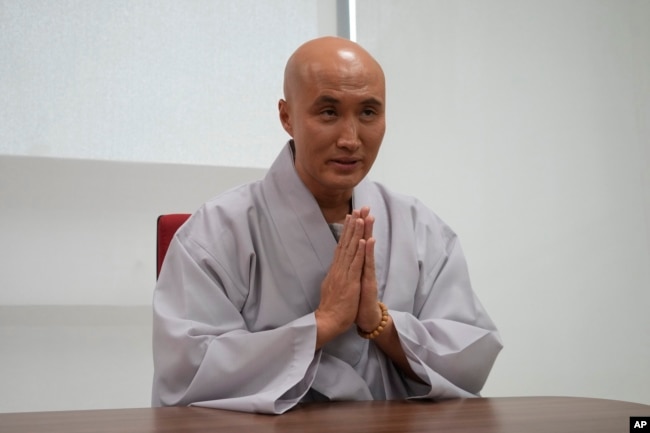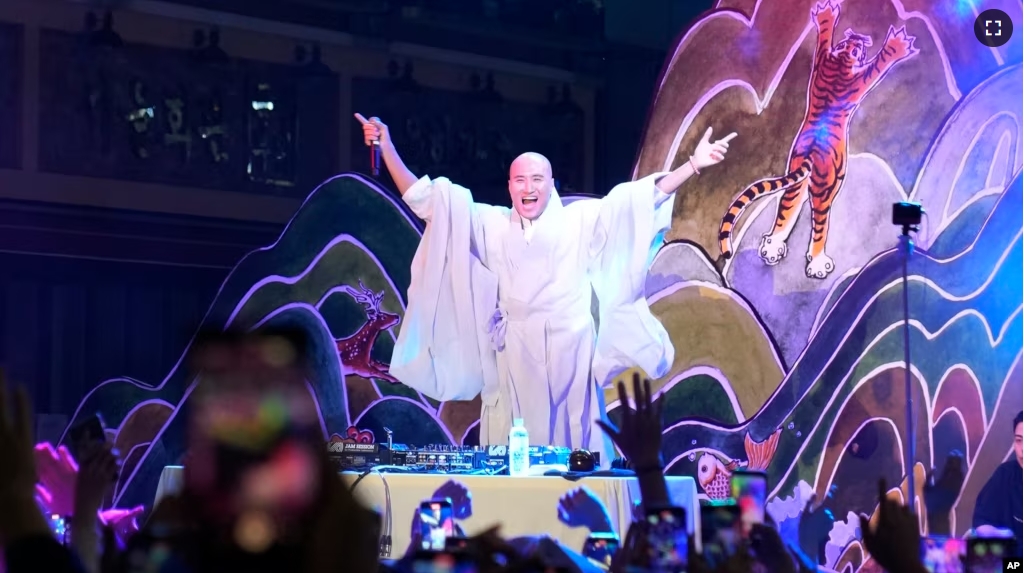Religious beliefs in South Korea have been decreasing for years. In 2021, just 22 percent of South Koreans between the ages of 20 and 29 identified as religious. In 2004, that number was 45 percent. Those numbers are from the Washington, D.C.-based data organization Gallup.
But that might be changing. Social media is fueling an increased interest in Buddhism among young people.
Music creator Youn Sung Ho is one reason for this increase. Youn said he has received support from younger generations for his Buddhist monk character. He calls the character NewJeansNim.
Youn said he created the character last year when he was performing at a ceremony to celebrate Buddha’s birthday.
He wore a hanbok, the traditional Korean clothing that looks like monk’s robe. He said a video of the performance got millions of views on social media. “That’s when I thought, ‘Oh, I need to make a character quickly,’” he said.
He carefully built his character while seeking support from Buddhist leaders in South Korea. His goal was to balance popular culture with Buddhist teachings.
NewJeansNim is a combination of Sunim, a Korean title for Buddhist monks, and NewJean, a name that a senior monk gave to Youn.
Youn’s music-creating character has appealed to many young South Korean adults. And the character has increased young Koreans’ interest in Buddhism.
Kwon Dohyun is a university student. He attended the ceremony and said he was happy to see NewJeansNim perform. Kwon told The Associated Press “Isn’t the hairstyle really hip?” He added that his interest in Buddhism also came from the inclusivity and openness of the religion.
Youn said he believes his attempts to break traditional attitudes towards Buddhism has gained support among South Koreans. He said that when most people think of Buddhism, they think of things like sitting still, quiet temples in the mountains and the sound of wind chimes.
“People think these are Buddhism, but what I am doing now is the opposite,” he said.

Venerable Beomjeong is another Buddhist who has been gaining young followers on social media. He is also known as Kkotsnim, which means “flower monk” in Korean. He is active on Instagram, where he communicates with both Buddhists and non-believers.
Beomjeon often shares photos of himself with descriptions including Buddhist teachings and his thoughts.
“People think monks are supposed to be noble, they are supposed to be in the mountains, they are supposed to be purer than anyone else,” he said. He added that he hopes to change the ideas around monks and Buddhism in South Korea through social media.
He said he receives many messages asking him simple questions about Buddhism. They include: Are monks not supposed to eat meat? Are monks able to get married? He has also been asked: “Will you marry me?”
Beomjeong said he aims for his answers to be clear but carefully worded. He said, “I tell it like it is.”
Beomjeong and NewJeansNim both say their efforts to bring in younger generations to Buddhism have left them open to criticism.
Beomjeong said Korean Buddhist monks had the opinion that a monk should not be sharing images of himself and using Instagram.
But Youn said such criticisms come from people who resist change. And he added that the younger generations “who want and like new things are so welcoming and love it.”
Beomjeong said he is happy to be considered an influencer if it means sharing messages about Buddhism with the public.
Beomjeong said, “I don’t know what it means to be an influencer, but if I can get many people to see and hear what I say, I want to be an influencer.”
I’m Gregory Stachel.
Juwon Park reported this story for The Associated Press. Gregory Stachel adapted it for VOA Learning English.
_________________________________________________
Words in This Story
monk – n. a member of a religious community of men who usually promise to remain poor, unmarried, and separated from the rest of society
character – n. a person who appears in a story, book, play, movie, or television show
robe – n. a long, loose piece of clothing that is worn on top of other clothes to show that someone has a high rank or an important job
hip – adj. very popular or fashionable
temple – n. a building for worship
chimes – n. a device that produces a sound like the sound made by a set of bells
noble – adj. having, showing, or coming from personal qualities that people admire (such as honesty, generosity, or courage)
